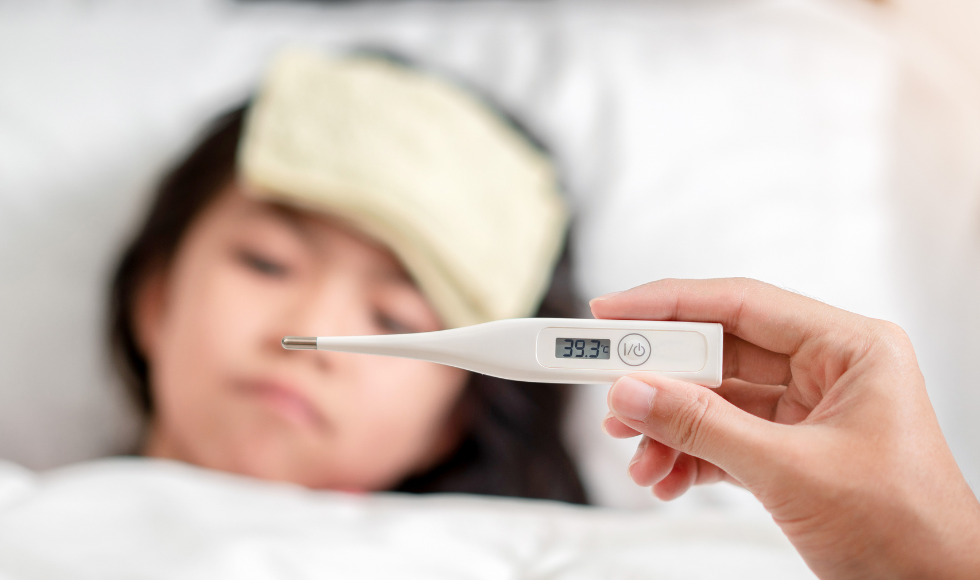Measles: How it spreads and what you need to know

Measles can be prevented with vaccination, with two doses providing a lifetime of immunity, says pediatric infectious disease expert Jacqueline Wong.
BY Adam Ward, Faculty of Health Sciences
February 20, 2024
Health experts worldwide are issuing warnings due to a drastic increase in cases of measles.
In late 2023, the World Health Organization released a warning after reporting a 30-fold increase in measles cases in Europe. The risk posed by measles prompted the Government of Canada to issue a travel health notice, and Peel Public Health is investigating a confirmed case of measles in a child.
 We spoke with pediatric infectious disease expert Jacqueline Wong from the department of Pediatrics about measles, how it spreads and what parents need to know.
We spoke with pediatric infectious disease expert Jacqueline Wong from the department of Pediatrics about measles, how it spreads and what parents need to know.
What is measles?
Measles is a virus that belongs to the Paramyxoviridae family of viruses, which also includes parainfluenza viruses, mumps virus and respiratory syncytial virus. Humans are the only natural hosts of the measles virus.
The disease often presents with fever, cough, conjunctivitis, white spots in the mouth (known as Koplik spots) and a characteristic body rash. Complications are common (even in healthy children) and may require hospitalization.
In more severe cases, complications can include respiratory failure, encephalitis, and death. People at highest risk for complications include infants and children under the age of five, pregnant individuals and people with compromised immune systems.
How does measles spread?
Measles virus is one of the most contagious infections and can be spread by direct contact with infectious droplets or by airborne spread. This can happen when someone who is infected breathes, coughs, or sneezes.
Why is there a sudden concern about measles?
Recently in Canada, most cases of measles are related to travel. Canada eliminated measles in 1998 through widespread vaccination programs.
However, there are many parts of the world where measles has not been eradicated. When someone who is not immune to measles travels, they can acquire the infection abroad and easily transmit it to others upon their return.
Following the COVID-19 pandemic, the resumption of global travel, combined with inadequate vaccination coverage, created a situation where outbreaks can occur.
The virus is highly contagious and can result in outbreaks among unvaccinated individuals. A society requires 95 per cent vaccination coverage in order to prevent spread.
As a result, there have been enormous surges in the number of measles cases (as well as hospitalizations and deaths) globally, including in other developed countries. Unfortunately, children bear the brunt of this burden.
How effective are vaccines in preventing the spread of measles?
Measles can be prevented with vaccination. After the first dose of a measles-containing vaccine — usually given shortly after a child’s first birthday — approximately 93 per cent of individuals will generate antibodies.
Following the second dose of a measles-containing vaccine — usually given prior to starting grade school — approximately 97 per cent of individuals will generate antibodies.
Almost everyone who did not respond to the first dose will respond to the second. Two doses will provide lifelong immunity in most people.
What should parents know if they plan on travelling?
Make sure your child has received all age-appropriate immunizations, including measles. In addition, measles vaccines should be considered for administration at an earlier age than usual for children travelling outside of Canada where the disease is endemic or has resurfaced.
Infants six through 11 months of age should receive one dose of measles, mumps, and rubella (MMR) vaccine. This will not count towards their primary series and they will still need two doses after 12 months of age according to their local routinely recommended schedule.
Children 12 months of age or older should ideally receive two doses of a measles-containing vaccine. The first dose should be administered at age 12 months or older, and the second dose no earlier than 28 days after the first dose.
As with all immunization, these additional vaccination dosages should be discussed with their health-care providers or in consultation during a pre-travel clinic consultation.


